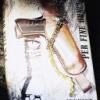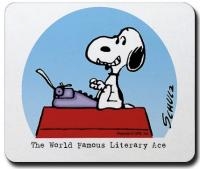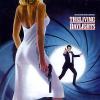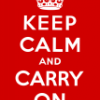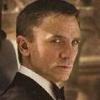- Eric Serra's score in GE is very, very good
- There hasn't been a good Bond film almost 2 decades
- Casino Royale is the most overrated film in the franchise

Unorthodox Bond Opinions
#181

Posted 10 December 2007 - 11:20 PM
#182

Posted 20 December 2007 - 12:41 AM
- FRWL is (for the most part) immensly boring
- LALD (the title song) is one of the worst songs in the series
- Moore's Bug-eyes in AVTAK are seriously sexy. No I'm not joking. (Of course I am!)
- Goldeneye's score, though unorthodox isn't any less 'Bondian' and makes the movie stand out, in a good way!
- TWINE is a very good Bond flick and Denise Richards isn't that bad
- Though I enjoy watching ALL the Bond movies, each of the Moore films are pretty dire
And despite the fact that Brosnan seems to get a unanimous thumbs-down round here I think his tenure was the best. In terms of quality consistency and the enthusiasm from the leading actor I think this is unambiguous.
Connery knocked 3 or 4 out the park but later he either lets the film down (YOLT) or the film is generaly poor (DAF).
Lazenby only did one great movie, unfortunately not what I would call a tenure.
Moore is such a bad actor its unreal. I enjoy ALL the Bond movies but he was the weakest part in all of his - team that with bizarre production choices (double-taking pigeons and tarzan-yells) and we have the most consistently embarrasing part of the franchise's history.
Dalton was interesting in his portrayal but I found him a little dry and 'his' Bond wasn't as well rounded. You could say he looked danegrous, I'd say he looked like he was on antidepressants.
Brosnan may have been plagued my the explosion-expectant tone of the 90s but it if horrific dubbing of most main characters in the 60s is acceptable I can live with slightly sloppy action scenes. That aside Brosnan always seemed to be grateful for the role and always looked like he was having fun. Call him an amalgamation if you will but I (and I think the paying public) found his films, for the better part enjoyable romps. Sure they are not as sophisticated as OHMSS or CR but that doesn't mean they are rubbish.
#183

Posted 20 December 2007 - 12:53 AM
#184

Posted 21 December 2007 - 01:54 AM
The DAD PTS is good.
#185

Posted 21 December 2007 - 01:57 AM
The four Brosnan movies are the worst-paced in the entire series and have terrible concluding setpieces (with the exception of GOLDENEYE).
#186

Posted 21 December 2007 - 02:10 AM
Agree about the concluding setpieces. They are all basically the same -- Bond and the girl alone face the villain and his minions on their turf, just with interchageable settings -- base, boat, sub, plane -- and still manage to win. I like GE the best due to the nice fight between Bond and Trevelyan, although the countdown sequence is right out of how many other Bonds?Not sure if this is an unorthodox opinion or merely a statement of fact...
The four Brosnan movies are the worst-paced in the entire series and have terrible concluding setpieces (with the exception of GOLDENEYE).
#187

Posted 22 July 2009 - 04:18 AM
- Eric Serra's score in GE is very, very good
- There hasn't been a good Bond film almost 2 decades
- Casino Royale is the most overrated film in the franchise
I assume that you've changed your mind about the middle one, since QOS came out, tdalton?
#188

Posted 22 July 2009 - 08:22 AM
Moonraker and A View To A Kill on the other hand are among the most purely enjoyable movies in the series
The Man With The Golden Gun is better than the book. But that's only because the book is lousy
Come to think of it, the movies, taken as a whole rather than using a case by case comparison, are a rather more impressive body of work than the books
Die Another Day was Brosnan's best movie, and tonally closer to where his whole era should have been
Quantum of Solace is Craig's best Bond film, and the best Bond film since at least 1989-1995 hiatus
Felix Leiter, while I enjoy his appearances, is a bit of a nothing character whose appeal I think is mostly in his niche name drop value.
Being "influenced" by blaxpoitation, Star Wars, Miami Vice, the Bourne movies etc. has actually been good for the series.
That Diamonds Are Forever did not provide much/any closure for OHMSS was not a cop-out and is not a problem. Not at all.
#189

Posted 22 July 2009 - 09:01 AM
- I think LTK is blatantly overrated
- CR is among my favourites, but i still think it's overrated so is Daniel Craig
#190

Posted 22 July 2009 - 10:05 AM
- CR is among my favourites, but i still think it's overrated
Agreed. While CASINO ROYALE does reside somewhere in my top 5, I do find it to be one of the more overrated entries in the franchise (although it's not nearly as overrated as GOLDFINGER).
#191

Posted 22 July 2009 - 11:42 AM
- Denise Richard's hot! (But lack of mind!)
- Madonna's song's cool!
- I hate Licence To Kill!
I have to think of more!
#192

Posted 22 July 2009 - 11:58 AM
- Charles Gray and Max von Sydow were great as Blofeld.
- Edward Fox was the perfect choice for M.
- NSNA and CR'67 are good movies. But I only consider NSNA as a Bond movie, CR'67 is a comedy.
- TMWTGG and LTK are the most underrated movies in the series, I love them both.
- Eric Serra's GE is a masterpiece.
- I like the DAD main title song by Madonna.
- Lulu's TMWTGG is a fine song.
- John Glen was good too, especially in the Dalton period.
- 007 Racing is a great game.
- ...
Edited by O.H.M.S.S., 24 July 2009 - 09:22 PM.
#193

Posted 22 July 2009 - 12:23 PM
Never Say Never Again is a disgrace, and I refuse to ever watch it again.
Timothy Dalton is the best Bond ever, although Craig is definitely second, maybe even joint first!
Diamonds are forever is crap.
Goldeneye is perfect, including the score.
Thunderball is the most overrated film in the series.
John Glen is one of the best Bond directors, alongside Martin Campbell and Terence Young.
#194

Posted 22 July 2009 - 12:56 PM
• Goldfinger is the best 007 film ever.
• Roger Moore is, after Sean Connery, the best Bond.
• Moneypenny and Q are great characters and should be return with film 23.
• Gadgets are cool and should return with film 23.
• Quantum of Solace is the worst film the series.
#195

Posted 22 July 2009 - 04:29 PM
- Risico is a very weak title
#196

Posted 22 July 2009 - 05:01 PM
Die Another Day and The World Is Not Enough are great title songs.
#197

Posted 22 July 2009 - 05:09 PM
Well, there is... but once you get past a few nasty habits and a comma, it ain't much.
#198

Posted 22 July 2009 - 05:38 PM
#199

Posted 22 July 2009 - 05:42 PM
#200

Posted 22 July 2009 - 06:09 PM
- Barry's work is generally mediocre at best, with OHMSS being a one-time exception to the rule, and Barry himself is insanely overrated by Bond fans.
And now to run like a little girl before the angry mob arrives
#201

Posted 22 July 2009 - 06:11 PM
#202

Posted 22 July 2009 - 06:15 PM
- Eric Serra's score in GE is very, very good
- There hasn't been a good Bond film almost 2 decades
- Casino Royale is the most overrated film in the franchise
I assume that you've changed your mind about the middle one, since QOS came out, tdalton?
I've backed off of my claims that QOS is the best Bond film ever made, as I've realized that it's not only too early to make that claim, but also because I no longer feel that way after seeing LTK on Blu-ray a few weeks ago. LTK is, for me, the best Bond film.
QUANTUM OF SOLACE is a good film, so I guess that the statement is true, but how good it actually is is something I'm not ready to determine yet. Also, I've come around enough on CASINO ROYALE to include that as a good film as well, but I still find it to be one of the most overrated films in the franchise.
A few more unorthodox opinions:
- GOLDFINGER is one of the worst Bond films.
- Dalton is the best Bond (certainly an unorthodox opinion in the "real world", but not necessarily on this site)
- The best decade for the Bond films was the 1980s.
#203

Posted 22 July 2009 - 06:17 PM
#204

Posted 22 July 2009 - 06:20 PM
-most of the so-called excesses of the movies have their origins in Fleming (e.g. over-the-top villains with lavish lairs, indestructible henchman, outrageously-named love interests etc.)
-the Bond of the books is largely blank a cipher - and Fleming even said as much: "I wanted my hero to be entirely an anonymous instrument and to let the action of the book carry him along."
-Roger Moore is a better Bond than Timothy Dalton
-Roger Moore is a better Bond than Pierce Brosnan
-Roger Moore is a better Bond than Daniel Craig
-"Casino Royale" is the most over-rated Bond film
-"You Only Live Twice" is the best Sean Connery Bond
-Lewis Gilbert is the best director the series has had so far
-John Glen's direction and Michael Wilson's writing nearly destroyed the series
-"Moonraker" is far superior to "For Your Eyes Only"
-a faithful, modern version of Fleming's "Moonraker" wouldn't work
-a faithful, modern adaptation of Fleming's "You Only Live Twice" wouldn't work
-"Diamonds Are Forever" is better as a film than as a book
-George Lazenby played Bond one too many times
-"Tomorrow Never Dies" and "Die Another Day" are better than "Goldeneye" and "The World is not Enough"
-"Goldeneye" is only slightly better than the John Glen films that preceded it
-Pierce Brosnan would have made a better Bond in 1986 than he did in 1995-2002
-Timothy Dalton was fired from the role
#205

Posted 22 July 2009 - 06:26 PM
Timothy Dalton failed because he didn’t try hard enough.
Oof, brave.
#206

Posted 22 July 2009 - 06:29 PM
#207

Posted 22 July 2009 - 08:15 PM
#208

Posted 22 July 2009 - 08:33 PM
#209

Posted 22 July 2009 - 08:43 PM
That's baloney; he changed over time:-the Bond of the books is largely blank a cipher - and Fleming even said as much: "I wanted my hero to be entirely an anonymous instrument and to let the action of the book carry him along."
Thanks to Daniel Craig (and his underrated predecessor Timothy Dalton) we've heard a lot of the phrase "Fleming's Bond," as in "Craig comes closest to Fleming's Bond, the ruthless government assassin" and so forth. This phrase has always rang false to me, perhaps because Fleming's version of the character was never a fixed concept. There are a few Bonds we could call "Fleming's Bond." Here's my own loose breakdown of the Ages of Bond--please feel free to post your versions:
01. Blunt Instrument Bond (1953-1956)
Fleming's original conception of Bond, the relatively characterless government assassin: the man who must always be a silhouette.
In Casino Royale Bond could almost be a figure out of the hardboiled noir genre, either the American tradition of Chandler and Hammett or the continental corpus exemplified by Peter Cheyney and Georges Simenon. He is a hard, tough man who kills because it's his job. In Casino Royale he almost threatens to turn into a human being, thanks to LeChiffre and Vesper, but the perfidy of Smersh convinces him to remain a "wonderful machine."
The wonderful machine is the figure who stars in Live and Let Die, Moonraker, and Diamonds Are Forever, all carefully-controlled, often procedural and mostly down-to-earth books. He is the consummate professional and as a character is intentionally kept flat. This is the humorless Bond that people often compare his film incarnation to. But when he falls in love with Tiffany Case (perhaps Fleming's best female character), he threatens to become human again. This leads to...
02. Almost Human Bond (1957-1961)
After the slack of DAF, Fleming decided to better his previous books with From Russia With Love. The book demanded a more rounded Bond, and Fleming was forced to delve deeper into his hero. We're told exactly what Bond looks like and given bits of his past history. In MR Fleming had given us the details of Bond's "everyday" life in London. Now we're given a fuller profile--Bond reminisces about his youth, worries that he's "pimping for England," experiences fear when his airplane's caught in a storm, etc. Because FRWL revolves entirely around a deathtrap for one man, it's important that this man be someone the reader can empathize with; he must be a recognizable human being. This Bond even has a distaste for cold-blooded killing greater than that of Instrument Bond.
FRWL exhausted Fleming with its realism and relatively tight plotting. He'd literally left the character for dead. Both Bond and Fleming recuperated with a ripping adventure story. With Doctor No Fleming hurled Bond into an overripe modernist homage to Fu Manchu. Having established a less brutal and more human, relaxed and approachable Bond to ground his narratives, Fleming could now pit him against giant squid, a "dragon" and a villain cut directly from the cloth of pulp fiction.
With Goldfinger Fleming, comfortable with his routine, plunged into full-blown self-parody. The book was a self-pastiche (much as the movie versions of YOLT and TSWLM are pastiches of the movies that preceded them) that ventured into the most fantastic realms of any Bond yet, thanks to the Fort Knox plot and characters such as Oddjob and Pussy Galore. Against all this outrageousness and implausibility, it was important for Bond to be a grounded character with a sense of the absurd. GF marks the point where Bond truly develops a sense of sardonic humor, all the better to help him cope with the fantastic adventures and people he encounters. The book is also notable because Fleming uses more free indirect speech than ever before, which puts us inside Bond's head. We get an intimate look at Bond's increasing unease with killing (the Bond of CR would have dismissed such feelings as vin triste) and are treated to his mental quotations of St.Augustine and so forth.
Fleming had arrived at an irony: his books had become more self-parodic while his hero's character has gained in depth. The stories collected in For Your Eyes Only, due to their often experimental nature, delve further into Bond's humanity. In FYEO he feels guilt about being M's hitman; in The Hildebrand Rarity Bond's love for nature is further explored; in Quantum of Solace Bond repudiates his job in empathy with the everyday "comedie humaine" of human relations.
03. Suffering Bond (1961-1964)
By the time of FYEO Bond was no longer a wonderful machine. He was not quite a fully-dimensional, complex human being--Bond wouldn't have worked as one, being a male-fantasy projection and figure for reader identification--but he was more human than ever before. Why? Because Ian Fleming failed.
Let's allow Fleming to explain:Now, you’ll notice that the James Bond of the first book was a straightforward man who didn’t really possess a total personality. In fact, in the first several books you’ll find absolutely no discussion of his character, few of his mannerisms, no character study in depth...I kept him quite blank, in a way, at first, giving him no quirks, no particular morality or immorality, not even a definite detailed personal appearance. As the series has gone on, however, James Bond has become encrusted with mannerisms and belongings and individual characteristics. This is probably a natural outgrowth of getting to know him better. I don’t know if this is good or bad, and I don’t know where all the elements that compose Bond come from, but there they are...As to quirks and tastes, likes and dislikes, bits of me probably creep in. But not important bits.
Fleming was being slightly disingenuous--important bits did creep in. In the first place, Fleming began sharing his health problems with his creation, as demonstrated in Thunderball, where Bond's body has begun showing serious strain for the first time. The book begins in a sanitarium and ends in a hospital. This is the beginning of Suffering Bond, a man battered by life and clearly showing it. It is also the beginning what we could call Loving Bond--from here on Bond's relations with women deepen and grow more meaningful. He falls in love with Domino, Tracy and Kissy, all of whom register as vivid characters (the first and last rival Tiffany, and Kissy may be the strongest Bond girl of them all). These are not light-hearted affairs, and in many respects they are dream fulfillments likely inspired by Fleming's now increasingly unhappy marriage.
After the strain (on author and character) of TB, Fleming made a dramatic right turn with The Spy Who Loved Me. Bond shows up as a knight in shining armor, but a humanly fallible one: he's almost squeamish about killing Sluggsy and Horror in cold blood and at times looks borderline incompetent. Having begun exploring his health problems in his books, Fleming now began inserting bits of disguised autobiography: Vivienne Michel's loss of virginity was based on Fleming's own first time (as noted by Andrew Lycett in his biography)--it isn't a stretch to see the callow, upper-class Derek as a veiled self-portrait of Fleming as a young man, penned by an older man now looking back ruefully on his treatment of women. After all, that is what The Spy Who Loved Me is really about: the mistreatment of women. A bright, intelligent young girl is disgracefully treated by a host of men from all sorts of backgrounds and nationalities, and the only decent man in the book is a completely unattainable one. This makes TSWLM even more devastating as a lament for the plight of women. One wonders why feminist critics have not given this rich and curious novel further attention.
Most of the critical attention it did get was uncomprehending, and the failure of TSWLM must have badly hurt Fleming. He retreated to a more conventional format but even then experimented: in On Her Majesty's Secret Service Bond falls in love and marries. This is the fullest portrait of Loving Bond, Bond as Caregiver, the man attracted to birds with a wing down who he feels the need to protect. (By now he's older and tired of messy affairs.) As in CR, he feels the call to put aside his career and settle down to marriage. But whereas SMERSH gave Bond a concept to fight against that helped him recover from Vesper's death, his guilt over not being able to protect Tracy almost destroys him.
In You Only Live Twice we find the apotheosis of Suffering Bond. In the beginning of the book he's been reduced to an helpless wreck. (When he wonders about where dead insects go he's touchingly human.) If misery demands company, Fleming demanded that Bond share it with him. That's not all that gets shared: in YOLT he demonstrates a greater sense of humor than ever before. Some have seen this as the influence of the movies, but that seems unlikely: the sardonic wisecracks of YOLT are different from the punning one-liners of the films. It's more likely that Fleming, after having given Bond his health problems and gloom, also gave Bond his sense of humor--it's of the sort Fleming repeatedly demonstrated in his letters. After a decade of living with Bond, Fleming had begun merging him with his own character (and other characters too--Dexter Smythe in Octopussy is another veiled self-portrait, one of Fleming gone to seed).
The ultimate end to Suffering Bond would have been death, but it was Bond who killed Fleming, not the other way around. Instead YOLT chronicles Bond's spiritual and near physical death and rebirth. He loses his memories and even his sex drive(!) and attains a short-lived happiness as a Japanese fisherman. It's rather a pity that he couldn't have stayed that way. James Bond had come to the end of his natural life and died, and out of his corpse emerged Taro--for a while anyway. Eventually the dying Fleming dragged himself to his typewriter and tried to feed the beast one more time.
The Man With the Golden Gun was nothing less than a reboot of the entire series. Introduced as a zombie, Bond regains life as a near-blank slate. Once a wonderful machine, and then a human being, Bond is now a broken-down machine trying to start up again. Practically the only human quality he exhibits is his complete inability to kill in cold blood--his final scene with Scaramanga is rather piquant. Had Fleming been in better health he might have gone further with the idea of Bond having totally lost his killer instinct, the quality that made him a Double O. (The Bond of Casino Royale would have been disgusted with how bad he'd become at his job.) Alas, Fleming had run out of zest and time. TMWTGG ends with the promise of the bland Bond, a man without a past or personality, poised for further inconsequential adventures with more cardboard women.
And so Fleming ceded his character to the movies. It was the end of an age, and James Bond would not have a fourth.
#210

Posted 22 July 2009 - 09:12 PM


